#Everything from minimum wage local jobs to local doctors teachers and lawyers
Text
the thing about Hawai’i politics is that. You absolutely need to criticize the local government. But you also need to stand the economic and political politics of living in a place where the local government doesn’t have an iota of the power of the mega corporations like Hilton and Sheraton that run mega resorts here, nor the billionaires like mark Zuckerberg, Larry Ellison, or Jeff bezos that run second homes here or have quasi-feudal estates or exert far far more power than the relatively progressive county and state governments
like. You have to clock what it is that a man worth over 100 billion dollars purchased 98% of an island. What that’s like. What power does a city councilman who represents that island in a council have over a man worth over 100 billion who both owns the land people live on AND the hotels they work at
#A) HI runs and is far more like a separate nation than another U.S. state even if under mainland colonial control#B) us imperialism is and always has run through the interests of mega corporations that may not be *officla* government actors#So so so many issues boil into the market forces in a Neo imperial world in a place with a long history of colonialism#schools struggle to keep teachers and local businesses struggle to keep employees because the wages don’t match the insane cost of living#Local agriculture and food industries struggle because the cost of supplies and cost of living for farmers#Makes their produce more expensive than most people can afford so we have to buy from Walmart#Young people and families keep leaving and there’s increasingly severe labour shortages for basically ever job in terms of#Everything from minimum wage local jobs to local doctors teachers and lawyers#So every aspect of local society struggles to keep going#And all those deficits make hi a harder and harder place to live#There’s market forces that are just. Beyond us all#also the most powerful gov actor by far is the national military and you think city council has more control than the pacific fleet? PFFFF
12 notes
·
View notes
Text
Notes from a Brown Boy - Kansas Diaries
*Author’s Note: Some people’s names have been changed to protect their identities
The rain was the first thing to greet me when I landed in Wichita. Overhead the gray clouds loomed, shadowing the farmland that yawned in the distance. Distance. At first glance, the city seemed like one long stretch of prairies and cracked parking lots, occasionally punctuated by billboards of grinning injury lawyers and lit up restaurant road signs.
If you spend enough time here amid the crumbling old buildings, watching the weeds sway in the vacant lots, you’ll feel the slow, inevitable creep of dread or something like it.
It’s easy to feel lonely here.
But, if you’re receptive enough, you’ll run into many friendly folks. Sometimes too friendly.
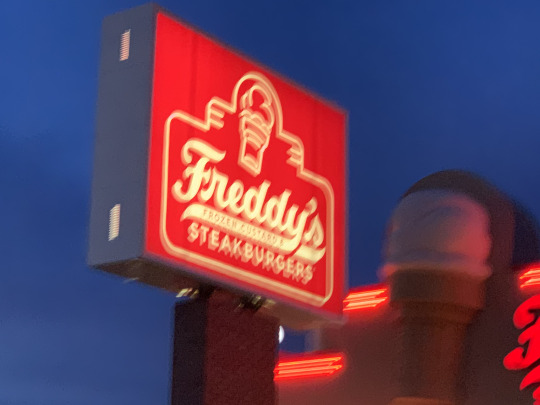
For example: During my first week, I went to Freddy’s, a local fast food chain, and ordered a crispy chicken sandwich with fries. The cashier, a young woman with glasses and short blonde hair, suddenly started confessing her fear that her 8-year old chihuahua wouldn’t live a long life.
“I still think of him as a teenager,” she said.
“Don’t worry,” I said. “He’s a chihuahua. They live long lives.”
Out here, in the most middle-of-the-road cities, you sometimes get a chance to show an act of passing kindness. While waiting in line at one of the hip, new cafes downtown, a place called Milkfloat, a tall elderly gentleman recommended which coffee and pastry to get.
“My wife says this place has the best cold brew in town.” Afterwards, grabbing his pastry and coffee, he wished me a good day. Most folks here always do and you better hope it comes true. Because here, like elsewhere, a day is filled with ordinary heartbreaks.
I will simply call her “Tita.” She works as a tailor at a department store, the only tailor working there, hemming and tapering racks full of suit pants under fluorescent lights. The nature of the job requires exact measurements and a keen eye for detail. She works hard, often skips lunch, and comes home dead tired. Her husband is recovering from 4 broken ribs after a car repair job went awry. Nothing can be done but wait until he gets better.
They live in a languid suburb on Wichita’s east side, a street with few sidewalks but plenty of lawn.
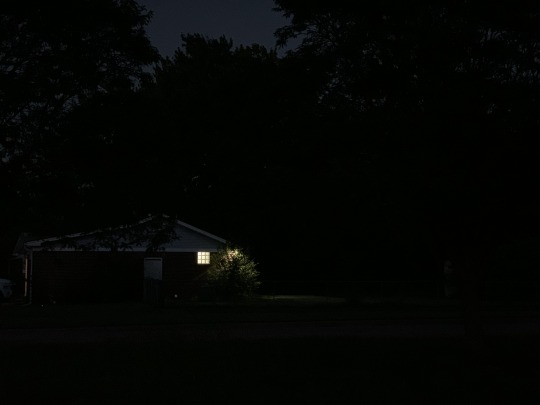
And noise. Plenty of noise. The neighborhood sits next to a car dealership. The skies overhead rumble continuously with airplanes and thunderstorms. Dogs bark at anyone who gets too close. A pickup truck blasts a corny country song as the cicadas and frogs belt out their lonely mating calls. Occasionally, a child’s laughter rises above it all.
Gossip is one of the great pastimes in towns like these. Even if you shut yourself up in your home, stories trickle in.
The neighbor across the street shot himself in the head.
The elderly couple that used to live next door got committed to a nursing home.
A fellow around the corner is on his third attempt to grow weed.
A college student starves himself morning to night so that he can save money for college.
Down the street, a kid lifts weights and punches the heavy bag hanging on his front porch.
Here, dumb luck seems, more so than in the big cities, the providence of God.
A man told me he got a job installing new carpets at a friend’s house. He was in desperate need of money, having sent most of it to his mother back home, who proceeded to gamble it away. When he ripped out the old carpet, he found a bundle of $10,000 dollars just lying there. His co-worker said, “We should split it.”
“No, no, we can’t take it.” the man said. He gave the money to his friend.
Sometime later, he went to the casino and couldn’t stop winning jackpot after jackpot. He brought home close to $16,000 in one night.
“So, if you do something good,” he told me, “God will remember that.”
Many people have come to live and die here, all of them wrapped up in the melancholic churning of faded ambitions and familial obligations.
Some people here have found something that returns them to the placidity they once felt in their youth. Sometimes that’s enough to keep them going.
For example:
I met Phil Uhlik, the namesake of the music store on E Douglas. He heard me playing an old Martin acoustic in one of the rooms. He shuffled in slightly hunched over, wearing a blue paisley shirt and brown shorts. He looked at the sunburst guitar in my hands and said, “It’s got a little beauty mark there.” He pointed to a small nick just above the sound hole. “All girls have beauty marks.” He pointed to his cheeks and smiled.
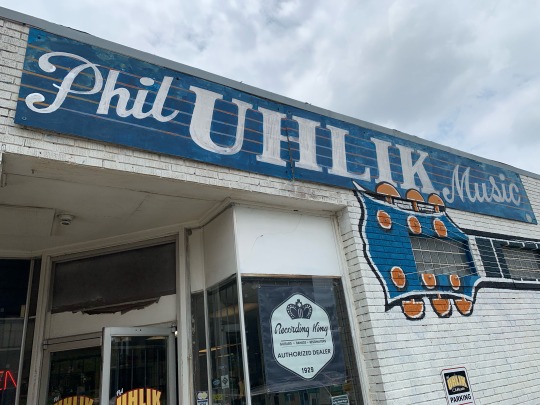
Uhlik started this music store 51 years ago and enjoys every moment of it.
“When you go to work for Boeing, that’s work,” he said. “But this, it doesn’t feel like work.” He motioned to the instruments all around him.
“How’d you get started?” I asked.
“I started off playing one of these,” he said, taking one of the accordions off a nearby shelf. As he strapped it on, all the years seemed to disappear. With a big crooked-teeth grin, he breathed life into the old accordion, his hands dancing up and down the keys. The smile never left his face as we bid farewell to each other.
I wish everyone in this world were as lucky as Phil.
I’m always seeking indie bookstores when I travel. Eighth Day Books provides much needed shelter from the summer heat. The shop was built 33 years ago and used to be located about half a mile east, in Clifton Square Village. About 17 years ago they moved to their current location, a 1920 Dutch-style colonial house on the corner of E Douglas and N Erie. Its blue trimmed windows peek through the foliage of neighboring trees.
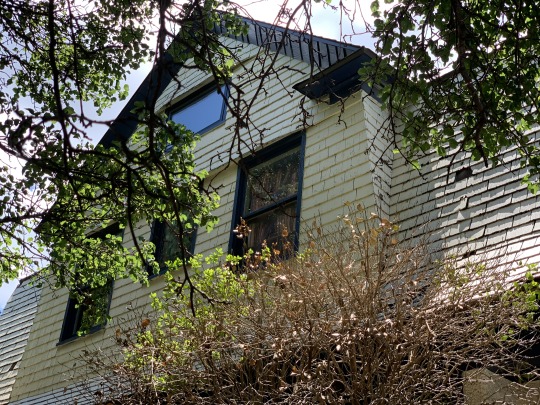
When you walk in, you’ll see shelves of books on Christianity and Theological studies, most notably in the Eastern Orthodox tradition. I’ve never seen a bookshop with a section dedicated to Iconography.
Wichita, despite its size, feels like a small place. And with that cramped spaciousness, you’re likely to run into someone you may remember or who may remember you. Here I ran into my girlfriend’s 8th grade English teacher. A bald, bespectacled man with a gentle demeanor. After a bit of catching up, he said to us with a smile, “I hope all your dreams come true.”
The short story writer, Raymond Carver, once wrote: “Dreams… are what you wake up from.”
Wichita is a land that hypnotizes you; it makes you dream, dream of something beyond the miles of strip malls and airplane factories, beyond the shocks of wheat and windswept plains, beyond the doldrums and ennui. But it also shakes you awake, reminds you that you’re in it, that you better stop dreaming.
I’m not the religious sort anymore, having survived the regime laid down by my Catholic parents. But there is something enthralling, maybe even inspirational, when I look at the rows of beautifully painted portraits of saints and martyrs. Such solemn faces surrounded by golden halos. According to the Eastern Orthodox tradition, such paintings transcend art; they’re supposed to be windows through which you can glimpse the divine. They remind me of my grandparents with their judging eyes and moral seriousness.
My book haul for the day:
Snow Country by Yasunari Kawabata
The Diary of Anne Frank
Earthly Signs: Moscow Diaries by Marina Tsvetaeva
Near to the Wild Heart by Clarice Lispector
In that last book, I found this lovely little passage:
…”in the Revolution, as always, the weight of everyday life falls on women: previously--in sheaves, now in sacks. Everyday life is a sack with holes. And you carry it anyway.”
From Earthly Signs, P. 40
According to the 2019 United States census bureau, 15.9% of Wichita's population lives below the poverty line. That’s higher than the state average, which hovers around 11.4%. That’s not the lowest nor is it the highest in the country. As befitting its location, Kansas is right in the middle.
The minimum wage in Kansas is still $7.25 despite efforts to increase it to $15. When Covid-19 hit, city and service workers bore the brunt of the impact. You can keep all your empty slogans like “We Love Our Frontline Workers.” Congratulate me all you want for my hard work but where’s my pay?
When you see that business here has returned to normal--people freely walking around without masks, no longer socially distancing--it still feels all too strange; we spent an entire year under lockdown. There’s still a pandemic by the way.
Loved ones fell ill, died alone, hooked up to ventilators in closed off hospital rooms. I believe every interaction now carries the weight of all those deaths. My family, like so many others, didn’t escape unscathed from the pandemic. My grandpa, Amang, caught Covid. Since he was an elderly citizen (and suffering from emphysema to boot), he was among those considered most at risk. We all feared the worst. Somehow he survived. The doctors called him a “trailblazer.”
Now, with businesses back to 100% capacity, I’m afraid that, just like the 1918 Flu epidemic, the past will fade like a nightmare upon waking. But it was so much more than that; it was an avoidable tragedy.
If you want to know what this pandemic has done to people and their livelihoods, is still doing to them, take a ride through downtown.
Things were already going bad before Covid hit. Back in 2004, the writer Thomas Frank wrote,
“There were so many closed shops in Wichita… that you could drive for blocks without ever leaving their empty parking lots, running parallel to the city streets past the shut-down sporting goods stores and toy stores and farm implement stores.”
What’s the Matter with Kansas: How Conservatives Won the Heart of America, P. 75
What led to all this blight? Frank attributes the decline to:
“the conservatives’ beloved free market capitalism, a system that, at its most unrestrained, has little use for smalltown merchants or the agricultural system that supported the small towns in the first place.”
-P. 79
The same story happens in a lot of places. A megacorporation keeps eating everything around it and leaves nothing else at the table.
The people are left hurting, a pit in their stomachs, and some asshole somewhere profits off of it.
While at the DMV, I overheard this:
“You have a good day now,” the security guard said.
“I’ll try my best,” a woman said.
My girlfriend heard them too and laughed.
“You really do have to try your best in order to have a good day here.”
At some point, we hit the town with a couple friends: Monica, and her boyfriend Will. Both are musicians trying to carve out their niche in a place that, on the surface, seems apathetic to creative pursuits.
It’s impossible to not be captured by their energy. As soon as we walk into their house, Monica, with her dark blonde hair draped over her shoulders, reached in for a hug. Will, a tall and bearded fellow with a bear-like presence, also went in for the hug.
“Ready to experience some Wichita nightlife?” Monica asked.
What is the nightlife here like? A group of high school punks wanted to fight us over a couple movie theater seats. Bored kids play rounds of “Chinese Fire Drill” at stop lights. I heard a nazi biker gang rolled into town at some point during my stay. Regular things like that.
At a low-key bar downtown called Luckys, I met a guy named Cory. He told me how he met a 15 year old kid loitering here, looking lost and forlorn.
“I don’t know what kind of advice I can give you but I’ll do the best I can,” Cory said.
This is the spirit I’ve often come across during my stay: A sort of slightly intrusive compassion. For a cynical Californian like me, the behavior seems a little strange, maybe even a little annoying. But I’ve come to appreciate the candor of it.
“Guaranteed we’ll know half the people here,” Will said.
Right away, he shook hands with the bartender—a high school friend of his—and asked him how his band was doing. Afterwards, we sat down and talked. Talking, after a year of pandemic lockdown, has become a lost art to me. But a little alcohol loosened the lips and suddenly I talked as though I’d known these people my whole life.
Will sipped his whisky on the rocks and told me:
“If everything in this world is meant to break down eventually, then any act of creation becomes an act of defiance.”
It may sound naive but to me, it’s true. I think about the words of the writer, John Berger:
Compassion defies the laws of necessity. To forget yourself and identify with a stranger has a power that defies the supposed natural order of things.
--The Shape of a Pocket, P. 179
Making art has to be, in some way, a compassion act, because it involves letting the environment and the people you meet speak for themselves, allowing a collaboration.
“When a painting is lifeless it is the result of the painter not having the nerve to get close enough for a collaboration to start… Every authentic painting demonstrates a collaboration.”
--The Shape of a Pocket, P. 16
You need to open yourself up, feel what someone is saying behind their words, and hopefully, feel what they feel.
Art, like Compassion, is defiant.
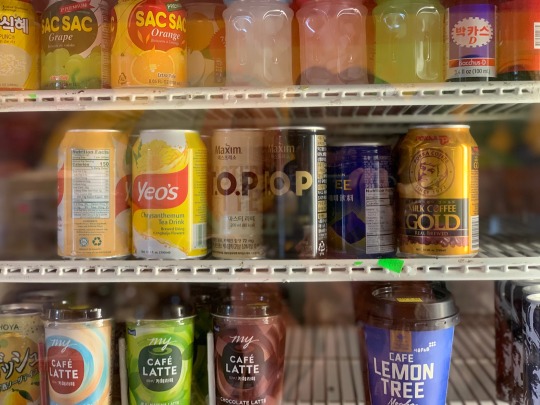
Among the 4 or so Asian markets here, you can find all the ingredients you need to cook up something good. During my first week, I stopped at a place called Grace Market. Like a lot of small Asian markets, it’s family run. A father from Taiwan. A mother from Korea. The son usually helps out when he can. Today (June 23), On this warm Wednesday morning, the son is manning the cash register.
“You’re from California? I’m from there too,” he said.
“Where at?” I asked.
“Sacramento. How about you? So Cal?”
“Nah, Bay Area.”
“Funny. That’s where my parents met.”
“Small world.”
On a different day, we met the father, a jovial man who never fails to say hi when you walk in. He came here over a couple decades ago from California, doing work for the US Army in Garden City. Once his service was over, he decided to stay in Kansas.
“I think you know why,” he said.
More and more young folks these days are leaving California. The high cost of living is presumably what’s driving this exodus. I told him I was also thinking of leaving the Golden State, as much as I love the place.
“Well, a town like this has a lot of potential if you want to save money,” he said. “If I tried to start this business in California, I don’t think I could’ve done it.”
The summer heat can, with the suddenness of a lightning flash, give way to thunderous storms. Speaking as someone from California, whose home has gone through excruciating periods of drought and wildfire, these nightly downpours are a startling yet relaxing sight.
The distant boom of thunder in the distance reminds you of how much of our lives depend on the weather, how small we are in comparison, how we are never separate from the goings-on of nature. The rain doesn’t come down lightly here. At night, it smacks and drums against the window pane with all the force of an animal trying to get inside.
But I don’t find myself frightened by it so much as awed by the combined power of wind and rain colliding against our rickety old house.
Kansas lies in the Great Plains, where layers of cool and warm air often combine into a low-level jet stream. Unimpeded by any natural obstacles on the wide flat plains, the wind roars across the expanse. Thunder growls over the prairie. And lightning flashes on the horizon in a fearsome red tinge.
The storm rages throughout the night, the only source of light in an ocean-sized plain.
“In general, the gods of the Wichita are spoken of as "dreams," and they are divided into four groups: Dreams-that-are-Above (Itskasanakatadiwaha), or, as the Skidi would say, the heavenly gods; and (2) Dreams-down-Here (Howwitsnetskasade), which, according to the Skidi terminology, are the earthly gods. The latter "dreams" in turn are divided into two groups: Dreams-living-in-Water (Itska-sanidwaha), and the Dreams-closest-to-Man (Tedetskasade)”
From The Mythology of the Wichita, P. 33
If you go downtown, you’ll see a sculpture called “The Keeper of the Plains.”
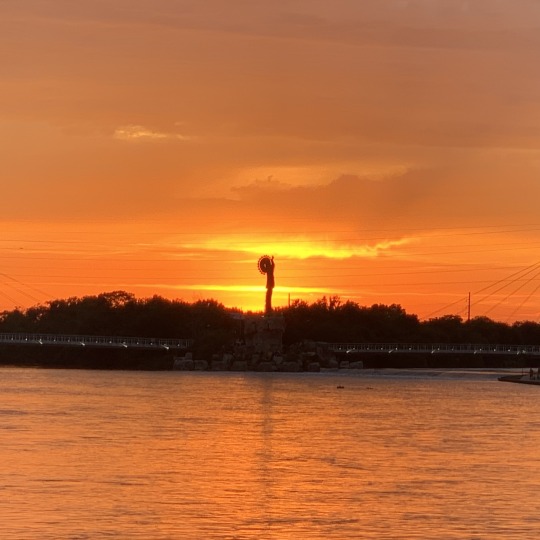
It’s almost 9 o’ clock when I get there, so large crowds have gathered to watch the ring of fire lit around its perimeter.
The statue was designed by indigenous artist and craftsman, Blackbear Bosin. Born in Cyril, Oklahoma, but living much of his adult life in Wichita, Kansas, Bosin was of Comanche and Kiowa descent and almost entirely self-taught as an artist.
When you come upon the Keeper of the Plains, standing tall on the fork of the Arkansas and Little Arkansas Rivers, you can’t help but feel a mix of admiration and sadness. It’s a striking statue, especially when set against the beautiful orange and lavender hues of the setting sun. But monuments like these end up reminding you of the Wichita peoples who were killed, displaced, driven from their land, and left to die in reservations, forgotten. The tribes that once lived here along the southern plains still show traces of their culture but now, you’ll see it mostly as a memory in a museum or as art hanging on the walls of a library.
I learned from a video by the Wichita Eagle that the last speaker of the Wichita language, Doris Jean Lamar, died back in 2016. It must be indescribably lonely to be the last speaker of a language. There is no one to have a conversation with, no one to whom you can confess your hopes or your regrets. But in the video, Lamar, even knowing that she is the last speaker, expresses hope that future generations will know what the language sounded like.
https://www.youtube.com/watch?v=5ScPkN_xGRI
Is forgiveness even possible when injustices are still committed today against native peoples everywhere?
Not enough can be said about the skies here, which seem at times so brilliantly marbled with peach and lavender colors that you begin to walk with your head perpetually craned upwards.
It’s this aspect, the overwhelming sense of the sublime, that will probably stay with me long after I’ve left Kansas.
I think again about the nature of dreams. It isn’t such a sin to dream about things, about things that haven’t happened yet, and about things that have happened. To quit dreaming seems too cynical, like admitting from the outset that everything is screwed, that you should stop trying.
During my stay here, I’ve met many people who aren’t so irony poisoned yet, people who are achingly sincere and kind. They haven’t stopped trying. There isn’t much room for cynicism here. I appreciate that a lot.
Farewell to you, Kansas, you and your clumps of cumulus and vast fields of cows and grass. I’ll see you again.
Check out Will’s music! It’s gloomy, melancholy, and LOUD!: https://teamtremolo.bandcamp.com/album/intruder
7 notes
·
View notes
Text

name: keylor jaire leon
birthdate: june 11th, 1997
birthplace: guanacaste, costa rica

“ For most, life won’t be a fairytale. it won’t be full of the highest highs, it won’t be a bank account with billions or vacations in private islands. it won’t be about a wardrobe full of gucci and prada, the latest gadgets and technology or the most expensive cars. for most, life will be average, at best. for most of us it’s battling day in and day out to make it work, to pay the bills and put food on the table, so what makes YOU, a boy who came from nowhere, think that you could be great? that you could be the one in a million? that YOU could ever make it without us? that you won’t follow the norm and end up behind a counter, working as a barista, making just about the minimum wage? ”
keylor was twelve when he first had his dreams shattered by a teacher who favoured the rich and the powerful, who had no issues labeling her students as though they were objects. he was much younger when he came to the realization he would be treated differently... because his skin colour wasn’t the same as the majority of the preppy english kids in his class, because english wasn’t his first language and his heavy accent carried his roots, because mum and dad weren’t entrepreneurs or doctors or lawyers or architects or anyone important following the society rules, because everything about him stood out in the worst of the ways.
it was never enough that he studied twice as hard as everyone, put extra effort in everything he did so he could fight for a good opportunity, to be someone in life. it was never enough that he excelled at sports, that he was all yes ma’am and no sir’s. it was never enough that he stayed longer to help around or that he voluntarily went ahead and tutored kids who were struggling in class ( even if most of them treated him like crap ). nothing he would ever do would be enough in a reality where people wanted him to feel like the weak link, like he was lesser, like he didn’t belong.
it would have worked and it would have broken him if he wasn’t born full of hope, full of strength.
in a world where he was made to feel like his life didn’t matter, he remembered who he was. he remembered how much his parents fought, how hard they worked, taking jobs way below their qualifications in a country that treated them as though they were second-class citizens, just to grant him and his siblings better opportunities. he remembered where he came from, he remembered the tears when leaving home and granny, he remembered the nights spent awake, trying to memorize words, learn a language that felt strange in his tongue. he remembered who he was. how proud he was to be from costa rica, how his skin colour and his ethnicity didn’t make him less but instead it gave him all the chances to prove everyone wrong.
and he did.
yes, he did end up behind a counter at sixteen, smiling up at sleepy people at 6 am and handing them their usual orders. he did end up in the street distributing flyers and on a bike, delivering pizza. yes, he did work weekends at an high-end bar, serving the same people who wouldn’t give him a second-glance at school and while they spent summers shopping in monaco or lazying in the beaches of santorini, he worked as a lifeguard at the local pool or whatever private club needed him.
and while he did all that? he stood tall, he stood proud of all he was. he learnt from the brokers who came to the coffee shop at 6 in the morning and the numerous millionaires, billionaires and alikes attending the private clubs and high-end bars. he learnt from all his bosses, he took notes. he found what he liked and what he didn’t like, while saving up money, while finding out ways to make passive income so he would never depend on a single monthly salary to survive. he figured out his interests and then he learned it. how it worked, how the best people in the world did it and succeeded.
more importantly, he believed in himself. he believed he could do anything he put his mind into as long as he settled goals and worked towards them, as long as he kept striving to be better and do better. he believed in himself even when he dropped out of university after a semester, realizing that wasn’t what he wanted for himself, that a degree wouldn’t make him stand out or lead him out of the loop he was in. it wouldn’t mean anything because a piece of paper wouldn’t prove that he was any better than all the kids who spent lessons sleeping and still got the bachelors anyway.
he believed in himself when, in 2014, he started an event-planning business that hired immigrants and minorities, allowing them to have a fair wage with good work conditions and a nice environment. he believed in himself when two years later, at nineteen, he founded a whole company dedicated to assisting businesses improving their customer service, which spiraled into two subsidiaries: one dedicated to teaching empathy and improving the work environment at enterprises and the other focusing on teaching fundamental rights and dismantling bias and prejudice in schools. he believed in himself when the quarantine madness led him to start a podcast dedicated to personal and business development through the simple idea of taking responsibility for your life, which became something far greater than he had ever imagined.
he believed in himself and so he became one of the names in forbes 30 under 30, he became a self-made businessman at the age of 20 and in the process, he managed to prove everyone wrong. because yes, he stood out like a sore thumb, but standing out was never meant to be a bad thing.
1 note
·
View note